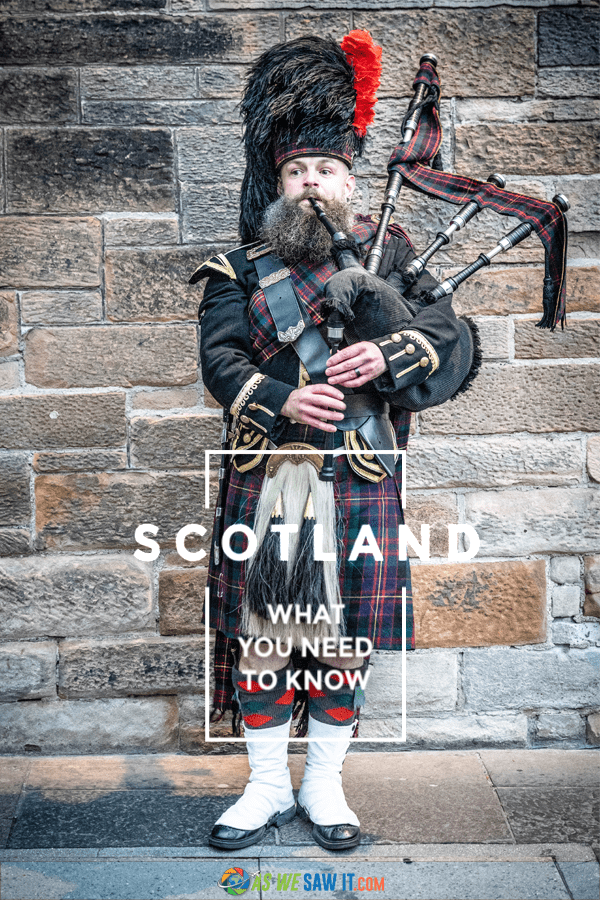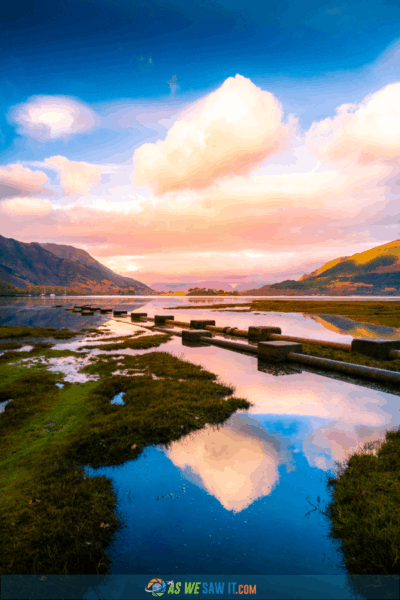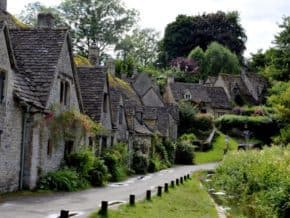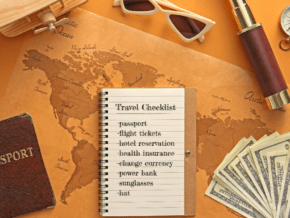With everything from dramatic history to spectacular landscapes, Scotland is bound to enchant you. It certainly did that to us!
We want you to visit Scotland and have as much fun as we did. We also want to help you make a good impression and avoid embarrassing yourself. So here are some interesting facts and things you should know before visiting Scotland for the first time.
1. Scotland has its own distinct culture

Scotland is not part of England, but a separate nation with its own heritage, history, and culture. So, while you’re visiting Scotland, avoid making any generalizations that group the Scottish with the English. Likewise, never call a Scottish person “English.” It’s insulting and shows your ignorance.
Scotland united with England in 1707. Before then, Great Britain didn’t exist.
ⓘ CULTURE TIP: Try to avoid discussing Scottish independence. In 2014, Scotland held a referendum on whether it should secede from Great Britain and become an independent country again. They voted to stay in the United Kingdom, but the result was close.
2. There’s a difference between Scotch and Scottish

People from Scotland are Scots (noun) or Scottish (adjective). Use the word “Scotch” when you’re talking about things that are of Scottish origin, like Scotch tape, Scotch eggs, and Scotch whisky.
Speaking of which, if you’re at the top of Edinburgh’s Royal Mile near the Castle, don’t miss The Scotch Whisky Experience! Even though I’m not a fan of Scotch, it was a highlight of my time in Edinburgh.
Forget stuffy museums, this place is all about learning how Scotland’s famous drink is made, nosing quirky scents, and of course, tasting some delicious whisky! Think Willy Wonka, but for grown-ups (and with less chocolate). This is one Edinburgh attraction that is worth the price of the ticket!
3. The Scottish speak English, but you’ll have to get used to it

Don’t be shocked if you can’t understand them the first time. They have a thick accent and use unique phrases, and they know it. If you can’t grasp what they’ve just said, most will be happy to slow down and repeat it.
But the Scottish might think you talk funny, too:
- Scotland’s capital is Edinburgh. Don’t pronounce it as Ed-in-burg or Ed-in-bor-row. Scots pronounce it as Ed-in-burr-a … or maybe Ed-in-bra.
- The main shopping street is Princes Street. It was named after the sons of King George III , so don’t call it Princess Street.
While you’re visiting Scotland, you’ll hear words like aye (yes), nae (no), wee (little) and loch (lake). Here, Ben and glen are not men’s names; they mean mountain and valley, respectively.
4. You should talk to the locals

One of the most fun things about visiting Scotland is meeting the people who live there. If you want to strike up a conversation with a local, I recommend making some casual observation about the weather. “Cold today isn’t it?” “Shame about the rain.”
It never hurts to be polite. If you meet someone’s eye in passing, say “hello” and smile. (A common response is, “aye.”)
If you’re invited to someone’s house, bring something as a gift. This can be a bottle of whisky.
5. Stand your round at the pub

There’s no table service at pubs; you order food & drinks at the bar. You pay for everything when you order.
Scottish culture dictates that if someone offers to buy you a drink, you should accept. You’re expected to order a round in return to show your thanks (“stand your round”), and everyone is expected to take part. Be sure to buy the next round before the current one is finished.
6. Scots prefer to avoid arguments
As one person put it, no matter how much you’ve had to drink, avoid talking about football, politics, or religion. If you do, you may end up in a passionate argument with some of the most opinionated people on the planet.
Speaking of which, keep your volume down. Talking too loudly in public is considered offensive and embarrassing. Besides, no one needs to hear your conversation.
7. Scots like to queue

Whether ordering drinks or at a shop, it’s considered extremely rude when someone barges to the front of a line for faster service. Scots are very respectful when standing in lines, so please wait your turn.
They also try to avoid any “small talk” while waiting, so as not to disturb others.
8. No one cares about your Scottish ancestry
Seriously, no one cares about your pedigree. If you can trace your family heritage to Scotland, join the club. There are bazillions of others just like you, and no one is going to be impressed.
9. Most people don’t wear kilts.
While it’s not unusual to see someone dressed in a kilt in Edinburgh, the vast majority wear regular clothing.
Scottish people generally save their kilts for special occasions, such as weddings or ceilidhs.
10. Bagpipers deserve a tip

It takes a lot of practice and skill to become a talented bagpiper. If you see a bagpiper on the street and stop to enjoy his music or take a photo, show your appreciation by leaving a tip.
Street performers earn their living by … well, performing. Think of it this way: How would you feel if you spent a whole day working and someone decided not to pay you?
11. JK Rowling did not write Harry Potter in the Elephant House
Elephant House advertises itself as “the Birthplace of Harry Potter,” but the truth is that JK Rowling visited several cafes when writing Harry Potter. Logically, it is far more likely that she spent more time around the corner at Nicolson’s Cafe, which was owned by her brother-in-law until it closed down.
The spot you’re looking for is now called Spoon Cafe Bistro. You’re welcome.
12. Not all souvenirs are “the real deal”

Beware of fakes along Edinburgh’s Royal Mile and elsewhere. Avoid shops displaying Loch Ness monster statues, “I love Scotland” t-shirts, or “souvenir of Scotland” boxes of shortbread. Also steer clear if you hear bagpipe music blaring out onto the street. Most of the stuff in these shops is likely made in China.
You’re more apt to find quality items that were actually made in Scotland at smaller places that are off the high rent, tourist track.
13. Avoid August in Edinburgh
Every August, people flock to Edinburgh for its many arts and cultural festivals, such as Edinburgh Festival Fringe. The city’s streets, cafés, and hotels will be full to overflowing, as thousands of tourists descend for a month full of theater, comedy, and music.
What this means for you is that prices for accommodation are particularly high in August…that is, if you can even find somewhere to stay. I strongly suggest coming in a different month if you’re just wanting to visit the tourist sites. Or, consider staying in Glasgow. Trains run regularly and the trip is only one hour long.
ⓘ PRO TIP:
14. Haggis tastes good.

If you’ve never sampled this Scottish delicacy—and you’re not vegetarian—then, you’re in for a real treat! Haggis usually comes with “neeps and tatties” as a side dish (a.k.a. mashed turnips and mashed potatoes).
Think of it as a type of sausage: a mixture of onion, oatmeal, sheep’s pluck (innards) and spices, all stuffed inside a skin casing and fried.
And please don’t let the thought of eating organ meat intimidate you, because you’ve already done it. After all, what do you think they put in hot dogs and sausages?
ⓘ PRO TIP: If you book a Scottish food tour, your guide will take you to the best haggis in town. Fun fact: Haggis is a common food at Burns Night celebrations (January 25th). Many places around the world hold this celebration in honor of Robert Burns, a famous Scottish author and poet.
15. Scots leave a tip … sometimes.
Tipping is not mandatory in Scotland and Scots wouldn’t dream of tipping at a pub. That said, it’s customary to tip 10% in restaurants.
Tour guides and hotel staff appreciate gratuities. These are tourist services and it is often expected.
16. William Wallace is a national hero.
William Wallace led his countrymen to fight for Scottish independence until he was convicted of treason in London and sadistically executed. Unfortunately, he didn’t look like Mel Gibson and he was never called Braveheart.
17. The midges are a nightmare.
Midges, or “midgies,” as the Scots call them, can be a real nuisance, especially in the Highlands. Americans call these tiny biting flies “no-see-ums” for a reason. A cloud of them will appear anytime the wind drops below 5 mph, so carry some insect repellent with you during midge season. Sometimes, the midgies are so severe that you may even need a head net!
18. If you don’t like the weather, wait a minute.

Scotland has incredibly changeable weather. The Scots like to say that you can experience all four seasons in one day. Brilliant sunshine can turn into torrential rain in a matter of moments, and balmy temperatures can quickly turn frigid.
Prepare yourself by dressing in layers – even in summer. You may want to carry a raincoat and wear waterproof shoes. And forget about umbrellas if it’s windy. Useless.
If you plan to hike, bring proper hiking equipment. Also, don’t rely on getting signal: Bring a physical map. And only go as far as you can safely navigate back.
19. Some areas take their Sabbath seriously.
In some parts of Scotland, such as the western isles, you won’t find a Sunday paper or an open shop anywhere. Tourist places may be open, such as hotels and bars, but some places may have reduced hours.
20. You’ll need exact change for buses
Most buses in Edinburgh don’t give change. If you don’t have the correct fare ready, you are going to lose a few pence. You’ll find the bus fares displayed at most bus stops.
21. Scotland offers a public transportation pass
If you plan to use public transportation to travel around Scotland, take a look at the ScotRail Travel Pass. The pass covers most trains, buses and ferries, and allows for multiple travel days.
Autumn is the best time to visit Scotland, when the heather is blooming and the kids are back at school.
Whether you’re in Scotland for city culture or outdoor activities in the highlands, we’re sure you’ll make even more discoveries. So if you have other Scotland travel tips, please share them in the comments.
Planning resources

Here are some useful links to help you plan your own trip.
- Tourism authority: Scotland’s tourism website has many useful trip planning resources.
- The code for Scotland’s international airport is EDI.
- Airport to hotel. Taxis are available, as is Uber. Another option is to book a private limousine service. They will greet you with a sign in the airport, help with your luggage, and escort you to your hotel.
- Visas. Project Visa is an easy-to-use tool that will tell you if you are eligible for Visa on Arrival (VOA).
- We use xe.com to calculate currency exchange values.
- Travel insurance. You’d be surprised at how cheap it is and how much it covers. Trust us, when an airline misplaces your suitcase for a week, you’ll be glad you have it. Learn more here.
Inspired? Pin this post and share it with your friends!






Scotch tape from Scotland!? Hahahha! Facepalm!
I loved reading your post and learned a lot from it. You truly have a sense of humor: “the Scottish speak English, but you’ll have to get used to it.” I’d love to visit Scotland, but I’ll make sure to avoid the midge season. Not fun having to carry insect repellent all around.
Haha – thanks, Anda. You’ll be happy to hear that you only need to worry about midges if you’re hiking in tall grass. Or at least, that’s what we’ve been told.
Thanks for the tips! I haven’t been to Scotland yet but it’s definitely on my list!
Yeah, Scotland is wonderful. Can’t wait to make a video for our YouTube channel. 🙂
I know what you mean by the accent. Pretty strong as I have a few blogging buddies from Scotland.
Ok, but here is a great question… Which is the hardest to understand? Cockney, Scot, or Irish?